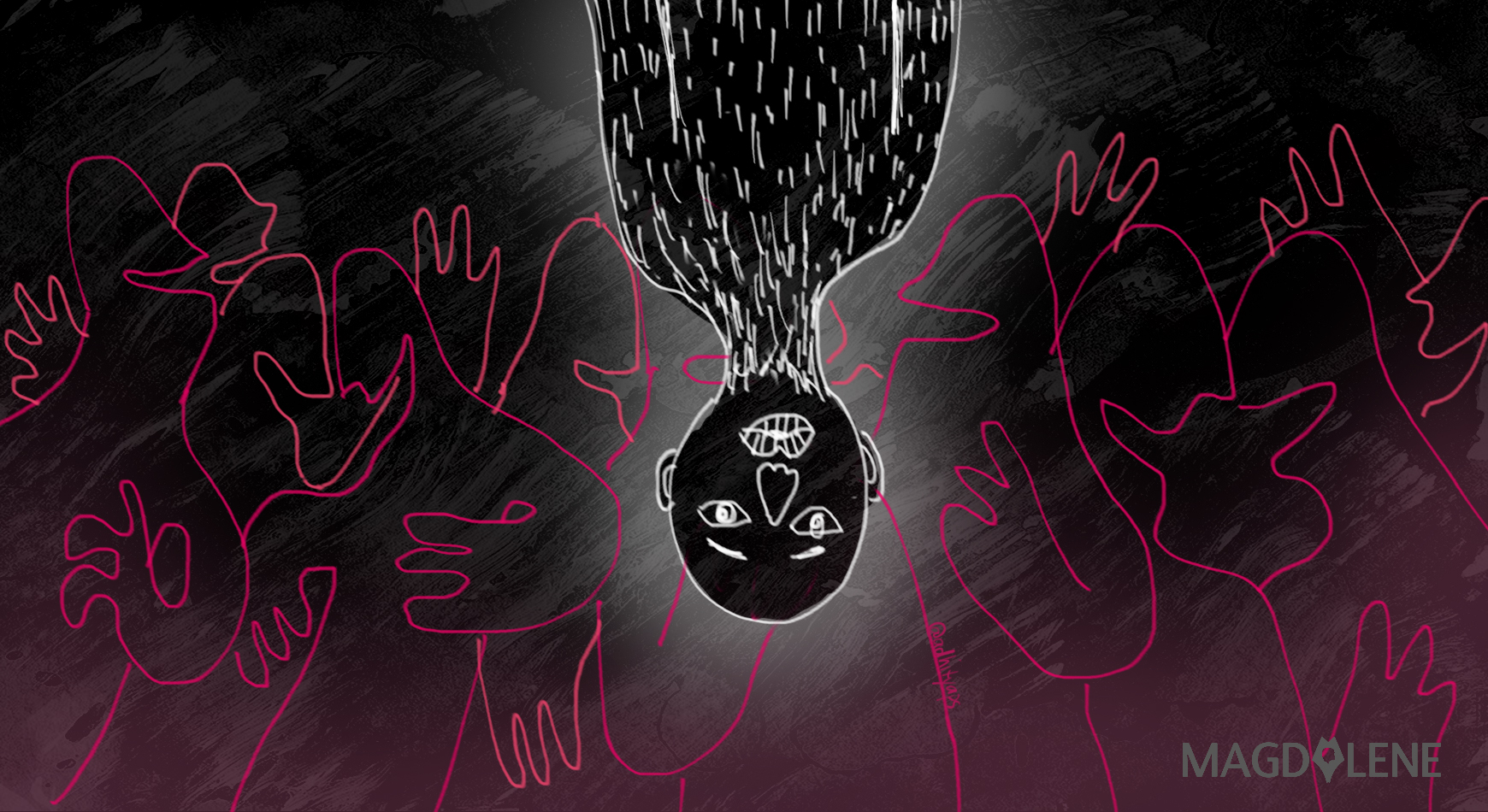I have been wallowing in self-pity lately. In the past two years, a lot of my colleagues have quit the company en masse to continue their career elsewhere. As a result, I have to have my lunch and dinner in the huge corporate canteen all by myself.
A constant observation in the huge canteen always makes me feel abnormal. Everybody else sits with their posse of friends, or at least a conversation counterpart. The room reverberates with laughter and chatters. I am alone with my own thoughts. On days when I feel lonely, being alone in the crowd can be painful.
A few days ago, in a scene which could be taken straight out of a comedy film, I was going to a theater by myself. I noticed that everyone was going in pairs. To my relief, I saw a guy walking by himself into the dark and cold studio….until I noticed his company following him behind. So I was the only one alone at the movie after all.
Since I was a kid I have always been insecure about being an outcast, at odds with everyone around me including family members and classmates. I used to think that it was my fault that I could not get along with regular people. As I’ve gotten older, though, I’ve come to realize that I might be part of a group of people – like artists, writers or academics – who seem to be destined to live our lives outside of society, because our way of thinking might not necessarily be understood by most people.
In this piece, Vidi Aziz argued that solitude is necessary for creative process. I have found, based on my own experience, that my most “daring” and honest pieces come into being when I am in a state of total surrender to the creative force, in solitude. The sense of having nothing and having nothing (and nobody) to lose when I am in my darkest hours and could not find anybody to turn to but my own mind and my computer helps me produce these daring and honest pieces.
Still, I find little solace in this understanding. Indonesia is a highly collective society, and, as Aziz writes in the article, withdrawing from society, like for instance going to the theater or even eating your food by yourself, could result in your being labeled “weird” by others. I don’t like it when people ask me, “Did you come here by yourself?” As if it is wrong to do so.
In my college years, many of my classmates also made fun of me for always spending time along and burying myself in books. My family members call me “asocial,” noticing that I do not have a lot of friends. As years go by, their words were absorbed in my brain and become my own voice of self-criticism and doubt. Today, whenever I go out by myself and look at other people having fun with their peers, I think, do I have poor social skills? Am I unattractive? Maybe I am a boring person because I’m just way too serious?
The self-doubt gives way into a more toxic emotion: envy. I have a very good and close friend and I am ashamed to admit to myself that I have started to envy him for his great social skills. Wherever he goes – whether watching movies or even just going to the shopping mall to buy stuff – he always has friends with him for company. He is also a great organizer who can arrange parties and functions that people will attend. I have tried to arrange fun gatherings myself and could only smile bitterly at my own failure to convince people to come.
“I just can’t stand living by myself. If I were you, who have to live in a boarding house by myself, I would probably go crazy,” he told me once.
Self-pity and self-doubt will never lead us anywhere but a sense of pain and envy at other people, I figure. In order to tell myself I am okay, I think that people could not be put into boxes. The average Indonesians will thumb their nose at the asocial guy who keeps to himself in the corner, but I have started to create some exceptions to that rule.
First of all, different people have different ways of thinking and performing their duties to society. As I have mentioned briefly in the first part of this article, writers and artists require an internal process that entails withdrawing from society once in a while in order to create something. Our way of thinking, which involves serious contemplation most of the time, requires us to be more selective in our conversations and relationships. For me anyway, I’d rather go alone than forcing myself to join a group of people who will only trap me in unnecessary small talks.
Some writers and artists, unfortunately, including myself sometimes, choose to see this as a burden. Many people have romanticized the role of writers – people who have “sacrificed their lives and tread a solitary path in order to contribute to society.” In this Jakarta Post piece “The Writer’s Curse”, the author Donny Syofyan argues that due to the nature of our work, writers are burdened with a double curse: loneliness and [exhaustion due to our] intellectuality.
Both factors, too, have expended my physical and mental energy. I asked my friend what the hell I was doing as a journalist and writer, trapping myself in a tiny box while draining so much of my energy trying to refine my skills and expand my knowledge to support my writing projects.
This is where the danger of romanticizing your job comes in, really. The only thing that it can give you is bitterness. Another danger that comes from the sense of sacrificing so much of your personal and social life for your writerly duties is a sense of self-entitlement and big ego. I have seen this consumes a lot of senior journalists and writers. Initially I was pissed off by their arrogance, but once I began to understand what their careers were made up of, I started to show some empathy. No wonder they have become hardened and bitter in their old age.
This is where my friend, an editor for a big publishing house, advises me not to take my work too seriously. Do it in a fun and relaxed manner, she says.
“After all, this is the only job that you are willing to engage in; I wonder if a person like you will stand working as an administrator or salesman,” I heard my editor advised my colleague, a burned-out journalist, recently. The advice works for me as well.
While the satisfaction of learning new things constantly as a writer or journalist never fails us, what about the constant pangs of loneliness that haunts us? What about the desire of having a normal life in which we are just like other “communal” Indonesians who belong to our posse of friends and spend our time together with them instead of being hermits?
But being part of a group that is too cohesive is not without its risks. The judgmental nature of collective societies – which requires us to conform totally to group norms – can be difficult. I have also seen tight-knit adult clique members involve themselves in painful, high school-like conflicts. When you are too close to certain people, crossing boundaries and conflicts can be especially painful. As part of a collective society we could actually learn how to respect one another’s boundaries – which could happen only when we respect our time being alone.
Maya Angelou said: “You only are free when you realize you belong no place – you belong every place – no place at all.” Instead of limiting yourself to just one gang, you might want to open yourself to different people across different walks of life. And this is actually a strong point for journalists and writers. We might not have a group of friends to accompany us to the shopping malls all right, but we easily open ourselves up to new people. The nature of our work requires us to make frequent conversations with strangers.
While a journalist has to talk to his or her sources, with the help of many people along the way, literary writers also have to talk to strangers to research her novel, for instance. When we listen to other people, we are really present and receptive in order to turn their stories into our own crafts. This soul-to-soul connection, I find, is far more valuable than merely small talks that we force ourselves into with people we do not even like just for the sake of getting along, or not to be perceived as a weird loner.
So I have arrived at the conclusion that being a weirdo in the corner (whether of the corporate canteen or a theater, in my case) does not mean that we do not possess enough social skills to draw people in for company. As writers, artists and academics, we possess slightly different skills than people who are capable of organizing a rally, or social butterflies who are always successful in throwing parties. The people who have talked to us and touched us with their stories in our creative process, they are with us always, even when we are alone – just us and our shoes.







Comments